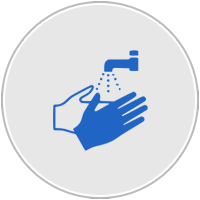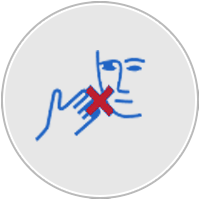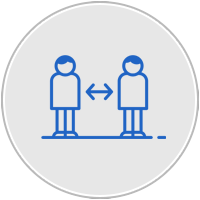Frequently Asked Questions
A. Contrary to popular belief, you need not get tested if you have a cough or fever or both. But yes, over and above this, you should get yourself tested if you meet the following 2 criteria:
a. You have come in contact with a laboratory-confirmed case of COVID-19
b. In the last 2 weeks, you have travelled to a place where there is an outbreak of COVID-19
a. You have come in contact with a laboratory-confirmed case of COVID-19
b. In the last 2 weeks, you have travelled to a place where there is an outbreak of COVID-19
A. It usually takes 5-7 days for the Coronavirus symptoms to appear. In rare cases, this can go up to 14 days but in most cases, the symptoms appear within 5-7 days.
A. Everyone need not wear masks. Wearing a mask results in constant touching of the face to adjust the mask. This can, in fact, increase the chance of getting the infection. But yes, wear a mask if you have a cough & cold so that you don't transfer the germs onto someone else. Besides this, healthcare workers should be wearing masks considering the environment they operate in.
A. If you are coming in close contact with this colleague, it is advised that you self-quarantine for 2 weeks, report to nearby health facilities and get testing done.
A. Yes, it is safe to visit a hospital with Coronavirus patients as they are usually in isolation. Also, the nature of the virus is such that it does not spread very far as it spreads only through coming in contact with infected droplets. Having said that, unless it is essential you should avoid going to hospitals housing Coronavirus patients. It is advisable that people going for routine tests should postpone their appointments.
A. There is no evidence to suggest that as cases are still rising in tropical countries like Singapore, Malaysia, Indonesia and Thailand. That said, the rising temperature and high humidity levels may decrease the transmissibility of the virus but may not kill the virus.
A. COVID-19 is a viral infection. So, if a cured person is exposed to it, he/ she does have a chance of contracting it again. But this time, because of the presence of antibodies, the level of severity will be much lesser.
A. There is no evidence to suggest that. Some arguments do support that they help improve immunity in general, but no evidence that this is a treatment for COVID-19.
A. Coronavirus is a novel virus which came from the animal species. It is not in the blood but in the upper respiratory tract. Therefore, there is no requirement to get blood tests done or screen blood donors for Coronavirus.
A. Neither hot water or alcohol (as is the popular belief) will kill the virus.
A. If you can use soap & water it is the preferred option. This is because we wash our hands properly and use soap all over our hands - the back, the front, between the fingers and under the nails. This results in better cleansing of the hands. Hand sanitizers, on the other hand, are usually put on the palms & hence may not do as good a job. But if you are out & about, then hand sanitizers are a good workable option.
A. COVID-19 spreads through infected droplets. So, if such droplets are on a surface and you touch it, you can get it. Also, since the virus can survive on surfaces for a fat least ew hours it is a good idea to clean doorknobs. Further, if you are often touching a doorknob, wash your hands after or use a hand sanitizer regularly.
A. Cardboard surfaces - a few hours. Metal-based surfaces - 6 to 8 hours as they are likely low temperature, high humidity surfaces.
A. There is no evidence that suggests this. The Coronavirus started with animals and reached humans. There is no data which supports that this is an animal virus anymore. Hence, eating outside food or non-veg food will not infect you.
A. There is limited data on this. However, pregnant women should be extra careful and should avoid crowded areas. They must practice social distancing and wash their hands regularly.
A. Avoid taking flights if possible. If you must, ensure you wash hands regularly.
A. Yes. Elderly groups above 60 years of age are more susceptible to this virus and have been seeing higher mortality rates. In addition to this, people suffering from diabetes, hypertension, chronic heart disease, chronic respiratory disease are at high risk.
A. The global trend is still on the rise. Whether it is the US or Europe. Evidence suggests that COVID-19 cases will rise over the next few weeks. Post that, one can expect a downtrend, as is being seen in China.
A. No data suggests that Indians are more immune to this virus.
A. Smoking does cause a decrease in the respiratory defense mechanism & therefore the recovery does slow down. It is advised that people decrease or stop smoking as it can lead to a delayed recovery.
Best practices

Wash hands regularly

Avoid touching face, mouth

Practice social distancing

Avoid crowded places
